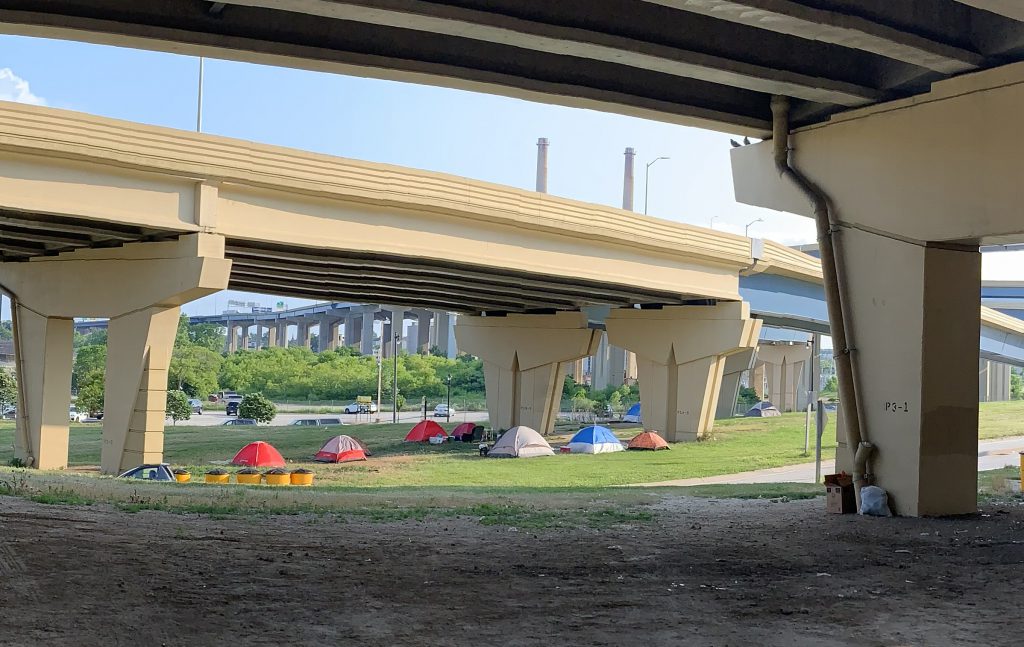Bill Would Criminalize Homeless Living on Public Property
The Republican-sponsored bill received a hearing in the state Assembly.
People living temporarily on public property would be subject to criminal charges, including fines and jail time, under a new Republican bill in the state Assembly. It’s raised fierce opposition from critics who say it will harm people experiencing homelessness, while the measure’s author says it’s meant to help them.
The bill received a public hearing Tuesday, less than a week after it was introduced as part of a package of legislation that Assembly Republicans say is aimed toward addressing the state’s workforce housing shortage. Those bills include provisions around zoning and approval of new workforce housing projects for certain local governments.
One of the bills, AB604, would make temporary living on public property a Class C misdemeanor. For people without homes, that could mean 30 days in jail or up to a $500 fine.
State Rep. Alex Dallman, R-Green Lake, is the sponsor of the bill. He said the proposal is a matter of public safety and compassion.
“We can’t just have people living in alleys around the city,” said Dallman. “We’d like to have them in an area where we can monitor the safety of the area and make sure that they feel safe as well, in the places that they live.”
But state Rep. Kalan Haywood, D-Milwaukee, said criminal punishment would hurt homeless people.
“We’re trying to get them to housing, get them into a job,” said Haywood. “I don’t think criminalizing them and giving them a misdemeanor or putting them in jail or fining someone who’s homeless — who I’m pretty sure doesn’t have the money to pay that fine — I don’t think that helps the problem at all.”
That bill would also withhold portions of grants to organizations supporting homeless people, unless such an organization can prove it has helped people get permanent housing or a job, or help reduce the number of people experiencing homelessness multiple times. Organizations that do so after six months would receive the remaining amount of the grant.
Jim Bohl of Milwaukee’s Intergovernmental Relations division said while the city has not taken an official position on the bill, several aspects of it have raised concerns.
Marjorie Lewis, a coordinator of the Safe Haven shelter program in Madison, gave testimony against the bill, partly because of the criminalization provisions and partly because of the grant withholding provisions, given the current lack of affordable housing.
“When you’re sending someone in to navigate in a marketplace where there isn’t any affordable housing and then saying, if you fail, we’ll take your money away and we’ll give it to somebody else, who’s going to do what?” said Lewis. “We don’t have housing to navigate. That’s one of the biggest problems that we’re facing.”
The proposal also creates grants which would be used to hire housing navigators who would do work like serving as a liaison between homeless assistance programs and landlords and property managers.
“I believe the population will, in fact, either move to a different location or be able to be put into a program that would help them out,” said Dallman.
State Rep. Jodi Emerson, D-Eau Claire, noted her concerns over the bill taking away the ability of first responders to help direct homeless people in the direction of shelters and other resources.
“We’ve seen it be very successful in Eau Claire,” said Emerson. “I’m opposed to this bill if it is going to do away with our local police officers’ opportunity to reach out to the homeless population in that sense.”
Kurt Paulsen, a professor of housing, land use and municipal finance with University of Wisconsin-Madison, said the bill’s provisions contrast with research indicating the expansion of permanent supportive housing is a solution to homelessness.
“Creating a criminal trespass for unsheltered homeless persons is moving in a different direction than expanding availability of permanently supportive housing,” said Paulsen.
Tackling the housing shortage
Paulsen said for the most part, the bills included in the housing package fall under the categories of financial resources and tools and zoning and land use regulations.
He said while the proposals would collectively begin to address the housing shortage, they would not solve the problems at hand.
Some of the proposals address issues stretching beyond the housing shortage. Paulsen noted AB608’s provisions around requiring cities or villages with water and sewer service to have at least one area where multifamily housing would be allowed.
“I think that policy, which you are seeing adopted in a lot of states across the country, is really trying to overcome some of the historical problems with zoning as it emerged in the 1920s and the 1930s,” said Paulsen. “Historically, the rise of zoning in the United States was rooted in exclusion of multifamily dwellings from single family communities.”
Other proposals that came up during Tuesday’s committee hearing included:
- AB606, exempting certain construction materials, supplies and equipment used for the development or rehabilitation of workforce housing from sales and use tax.
- AB607, creating a low- or no-interest loan program for the rehabilitation of some lower-income housing built before 1980.
- AB609, allowing towns and cities to create local housing investment programs funded by increases in tax revenues on certain tracts of land.
- AB610, limiting practices that can be used in assessing property tax values
Paulsen noted how the housing fund investment bill drew support from government officials across the state.
“I think that illustrates that housing is not just an urban or rural issue or a red or a blue issue, but that there are creative tools and policy solutions that can garner a wide range of support,” said Paulsen.
Voting is expected on the bill package in committee in the coming weeks. If it passes, its next stop would be the full Assembly.
Wisconsin Assembly proposal to criminalize living on public property draws ire from lawmakers, homelessness support groups was originally published by Wisconsin Public Radio.
If you think stories like this are important, become a member of Urban Milwaukee and help support real, independent journalism. Plus you get some cool added benefits.
Political Contributions Tracker
Displaying political contributions between people mentioned in this story. Learn more.























Arresting people for being homeless is barbaric and satanic.
Why aren’t the police arresting the people that cause homelessness?
Arrest Lloyd Blankfein of Goldman Sachs for shipping 30 million of our good paying American jobs to China.
Arrest Scott Walker and Diane Hendrick for their political crimes against working class and working poor Americans.
Arrest the politicians that spend trillions of our taxpayer dollars every year on bombs and bullets to kill millions of women and children in Iraq, Afghanistan, Palestine, Libya, Syria, Iran, Venezuela, Lebanon, Somalia, Cuba, Honduras, Nicaragua, El Salvador, Bolivia, Uruguay, Guatemala and Yemen…
And while you’re at it…..please don’t ignore Robin Vos and the rethugs in the WI legislature wasting $700,000.00 to please the fascist in chief aka The Former Guy.
To say nothing of their primary goal of giving even more money to the already rich in the state and grifting as much money as they can for themselves while doing as little as possible to benefit the health and general welfare of the citizens of the formerly great state of WI.
Do I sound bitter? At 76 I think I deserve to speak my mind!
In the 2012 documentary,” The Gatekeepers”, one of the leaders of the Shin Bet, Israel’s internal security agency was asked, how have things changed as a result of their efforts. He responded, “We have become a cruel people.” He didn’t mean that everyone in the country was cruel, but that those in power, cruel themselves, had empowered the cruelest people in society.
That has happened in our country, and, needless to say, in Wisconsin as well. And, as this proposed legislation demonstrates, cruelty is no longer an unanticipated consequence. Cruelty is the purpose, especially when it targets “the others.” And even when it is dressed up with the phony pieties of someone like Mr. Dallman.
If there is a way to legislate cruelty, the Repugs will find it.
Is “living on public property” different than “staying overnight on public property”? I wouldn’t object to overnight camping if it were regulated, limited to specific areas and campers were required to leave in the morning. In fact, it might be a nice way to bike the Door Peninsula.